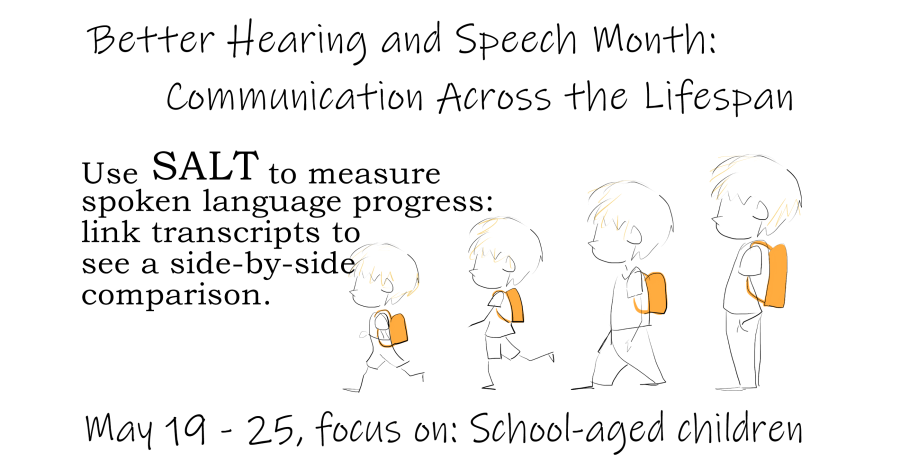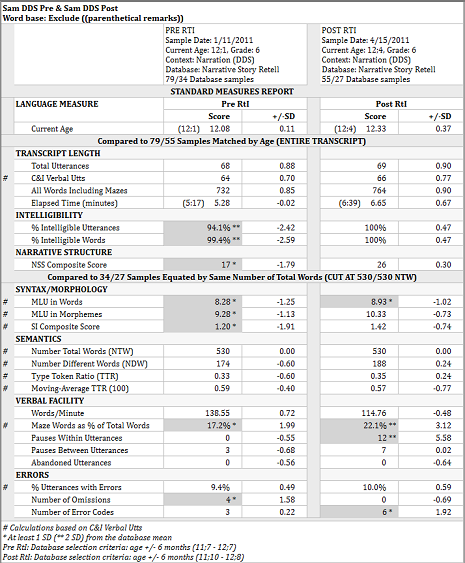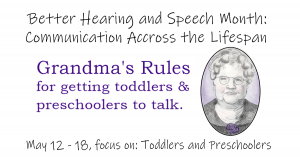
May is Better Hearing and Speech Month!

May is Better Hearing and Speech Month!
Published at: 2019-06-11
May 26 - 31: Communication Disorders in Adults
A Family Story My perfectly healthy, happy, and extremely social mother of 85 years recently hurt her knee. The pain became excruciating and the family was called into action for doctor appointments and subsequent in-home care. In order to heal, she needed to stay off her feet and was limited to sitting in chairs and bed rest. During her recovery the family became her lifeline, which led me to spend much more time with her than I had pre-injury. With increased personal interactions, I began to pay closer attention to her communication skills and, more importantly, to realize her communication needs. I’m an SLP. I know the rules, tips, tricks, and methods for proper communication across the lifespan. But was I practicing them with my own mother? Shame on me. I did far better with elderly strangers in the grocery store than I had with her. Unfortunately, it took an injury for me to really pay attention to this aspect of her life. To twist the guilt-knife further, it wasn’t like my mother hadn’t communicated her desires to me loudly and clearly over the past couple of years. She had told me many times, “Please slow down. I can’t understand you when you talk so fast.” So I would. For the duration of that interaction. On a number of occasions, she said, “I can’t really understand you when you talk to me from the speaker in your car.” But, heck, I’d call from the car speaker anyway because it was efficient ... for me. Many times she’s said, “I won’t be able to hear you if you’re talking to me from another room” as I spoke to her from “another room.” I would react and correct my ways, for that moment in time. But I didn’t put into practice what she preached. I would blow into her home like a Tasmanian devil, talk to her from the kitchen while she was in her bedroom, ask six questions in a row, and certainly, always, multitask while “communicating” with her. So, as I work on bettering my communication with my amazing mother, I write this to remind readers what we can all put into practice when talking with the elderly. 1. Be present. Settle in, take a seat, and set the stage for optimal conversation. No need to multitask. Other things can wait. Allow extra time than you might with a younger speaker. And, set the stage for an optimal interaction. Eye glasses on? Check. Hearing aids on? Check. 2. Remove distractions. If the TV or radio is on, ask permission to turn it off, or lower the volume. If you’re next to a running dishwasher or microwave, find a quieter spot. 3. Use eye contact. Some older people don’t see well. Sit face to face and not too far away. Give them the opportunity to look at your lips and your facial expressions to support their listening and processing. What’s more, eye-contact signals you are listening, attending, and interested. 4. Be an active listener. Be conscious about really listening. Be patient, especially if they’re speaking slowly or having trouble recalling labels or explaining concisely. Affirm with nods, facial expressions, and positive body language. Use short uhhuhs, mhms where needed. Ask clarifying questions if necessary. And avoid interrupting. Let them have the floor to make their points without rushing them along. Patience is a virtue! 5. Speak slowly. As we age, processing speed decreases. Give the listener the optimal input by slowing down and checking they’ve received the message. If retention is an issue, a slower rate, along with shorter sentences, is a big help. 6. Speak loudly. This is listener dependent. It’s not difficult to determine when hearing loss is affecting a communication interaction. Cues are abundant. Huh? What? Come again. Modify your volume to meet the needs of your listeners. 7. Summarize. This is topic-dependent. If there are action points required, or if the information covered was new or complex, summarizing the points can be extremely helpful. I am going to work implementing, and making a habit of these suggestions. It’s my responsibility to be a better communication partner to my aging mother. I’ve known what to do for a long time to effectively communicate with someone with a communication disorder. I just need to utilize my skills as a Speech Language Pathologist and put on my SLP hat when I see my mother. Now I need to unload my guilt and make improvements!
May 19 - 25: Communication Disorders in School-Aged Children
SALT has a slick way to measure the spoken language progress of school-age children. Link the transcripts of two language samples and voila! You’ll see the effects of the work you and your students have been doing to make gains. Here are the simple steps to linking transcripts in SALT:
- Click “link” in the tool bar, then “link transcripts”.
- In the dialogue box, click “open” to browse for your first sample. Do the same for the second sample.
- Click “link” in the dialogue box.
- Run your SALT analyses.
It's easy! And the result looks something like this:  Check out our post on progress monitoring for more ideas.
Check out our post on progress monitoring for more ideas.
May 12-18: Communication Disorders in Toddlers and Preschoolers

Remember Grandma’s Rules for getting toddlers and preschoolers to talk…
1. Grandma always makes me feel welcome! Be friendly and enthusiastic: Always smile when you greet a child. Be sure to establish eye contact and use vocal inflection. This will help you to generate a friendly demeanor. 2. Grandma always makes me feel important! Show that you value the child: Recognize the child’s comments as important and worth your undivided attention. When eliciting a language sample, show agreement and interest by nodding and maintaining eye contact. 3. Grandma understands me! Learn to think like a child: Remember that children’s perspectives vary, depending upon their levels of cognitive development. Be alert to a child’s awareness of action, time, space, and cause. 4. Grandma is easy to understand! Try to keep requests and directions simple by adapting your language, shortening your utterances, simplifying your vocabulary and reducing the complexity of your speech. 5. Grandma likes to hear me talk! Follow the child’s lead using open-ended prompts “Tell me more.” And open-ended questions “Then what happened?” Refrain from asking questions with obvious answers. Add new information where appropriate. Grandma likes to hear me talk! 6. Grandma listens to me! Above all, be patient and wait. Don’t be afraid of pauses. Allow the child time to answer a question. Don’t rush on to the next topic or direction. *These rules were developed by Dr. Jon Miller
No Comments yet. Be the first to comment.